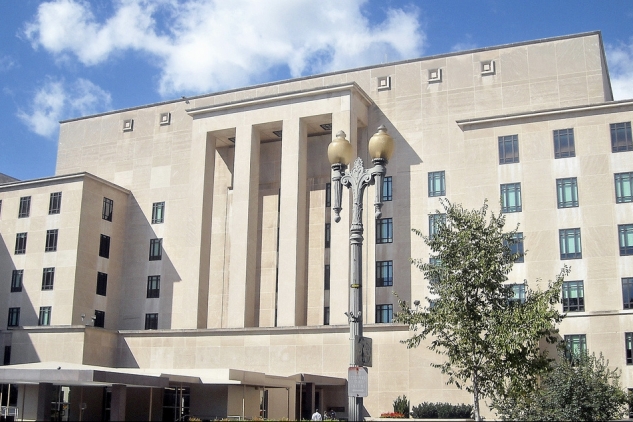
Peter Wieltschnig
Policy and Networks Officer
The UK in the US State Department’s Trafficking in Persons Report 2022 – Is this a Tipping Point for the UK’s Anti-Slavery Response?
Peter Wieltschnig
Policy and Networks Officer
Photo by APK
In July 2022, the US State Department published the 2022 edition of the Trafficking in Persons (TIP) report. While the UK retained its Tier 1 status, i.e., that it is deemed as fully complying with the US Trafficking Victims Protection Act’s minimum standards, the TIP report lays out a number of serious concerns with the UK’s anti-trafficking system. Certainly, the strength of the criticism towards the UK, despite its close relationship with the US, points to a nation that is withdrawing from its international obligations on trafficking.
We welcome the thorough and sustained attention paid in the TIP report to the UK Government’s continued efforts to jettison its legal duties and prioritise draconian anti-migrant legislation over safeguarding of victims. This muddling of modern slavery and immigration ultimately harms victims and survivors as well as wider society.
What’s going wrong?
The picture painted in the report is one of a protection and support system that is leaving victims and survivors out in the cold. Delays in determining victim status, failures to screen for human trafficking, penalising victims of criminal exploitation for acts that they have been forced by their exploiters to commit, among a range of other issues, are listed as key areas where the UK Government must improve.
Woven through the critiques of the UK’s anti-trafficking system is the concern that the immigration enforcement focus that the UK has adopted is causing serious harm to victims and survivors of human trafficking. Compared to the 2021 report, the 2022 edition points towards the Government’s attempts to erode protections and support. For instance, concerns voiced in the previous report around the conflation of immigration and human trafficking do not appear to have been listened to by the UK Government, but rather worsened by the passing of the Nationality & Borders Act as well as the creation of the Immigration Enforcement Competent Authority, which has been criticised by the Independent Anti-Slavery Commissioner and wider anti-trafficking sector. The refusal to provide a ‘clear route to residency for foreign victims and ensure potential foreign victims who are referred into the NRM can work’ as well as a wholly inadequate ‘leave to remain’ policy, where leave is rarely granted and when it is the duration is often only 12 months or less, is also highlighted within the report. The UK’s hostile environment policies severely hinder its ability to combat trafficking and dissuades victims from coming forward for fear of deportation. As Sir Mo Farah has bravely highlighted in talking about his own experience of being trafficked, disclosure of trafficking can take years, yet the Nationality & Borders Act means that so called ‘late’ disclosure can undermine credibility.
Rolling back protections
Similarly, one of the prioritised recommendations put forward by the US State Department is to ensure that the UK does not depart from definitions of human trafficking in international law, thereby limiting their obligations towards victims. The consequences of not being correctly identified as a victim are extremely serious: this can have a negative impact on credibility, give even greater control to an exploiter, leave someone without support or the opportunity to gain leave to remain as a survivor, at risk of destitution and removal, and vulnerable to further exploitation including re-trafficking. The recommendations include the need for the UK to ensure that the statutory definition of trafficking under the Modern Slavery Act 2015 does not require movement of the victim as an element of the crime. Already we have seen the UK government seek to enshrine a definition that requires movement in a way that risks creating confusion, raising the threshold for identification and breaching international law. These efforts were roundly condemned in the UK House of Lords, resulting in a motion to regret concerning the Slavery and Human Trafficking (Definition of Victim) Regulations 2022 which ‘give rise to concerns that the changes will narrow the ability of victims to be identified and to access support.’
Forthcoming Modern Slavery Bill – missed opportunities?
The UK Government is currently taking steps towards a new Modern Slavery Bill. This provides an opportunity for the UK to demonstrate its commitment to international law by incorporating the Council of Europe for Action Against Trafficking in Human Beings (ECAT) into our national legislation, together with a commitment to retain the Anti-Trafficking Directive. Briefing on the need to scrap protections and support for victims of trafficking to push through their cruel Rwanda deportation plan, the Government is stepping further and further away from international commitments the UK was only recently proud to make, and the measures needed to retain Tier 1 status. We call on the UK Government to take this moment to implement the recommendations put forward in the 2022 TIP report, and build up, rather than strip back, the UK’s anti-trafficking system. Should the UK continue along its current trajectory, this may act as a tipping point, where the UK can no longer consider its international standing in combatting human trafficking as secure.
